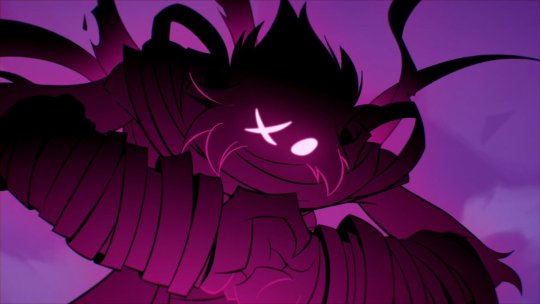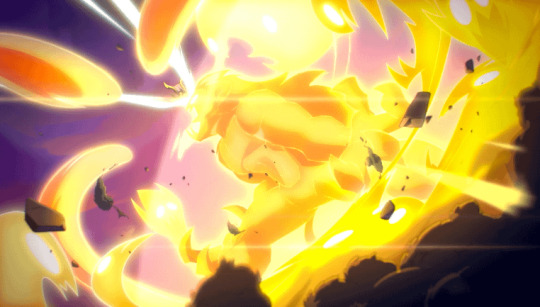#fa3 xiang4
Text
⚠️ I am not chinese, so if any chinese person in the fandom wants to add something or just point out any mistake, please do ⚠️
I've seen people in the fandom call Macaque's smoke monster 'kaiju', but this is not a correct denomination.
It is better to call it "法相" (fa3 xiang4), meaning "image of (commonly Buddha)"
"佛教术语,指诸法之相状,包含体相(本质)与义相(意义)二者"
Trans.
"A Buddhist term that refers to the appearance of all dharmas, including both physical appearance (essence) and righteousness (significance)"

Following this definition, a 法相 is your true self, your essence, both physical and spiritual... meaning that Smokey (little guy) is not a 'kaiju'. It is an essence, Macaque's.
Same goes to all manifestations of characters who have a version of their 法相, it's their true essence.

Yes, you got it right! This little (not so little) guy is also a 法相.
(Don't call them 'kaiju', please).
Just to add, they can also be called 'war forms', since they appear in the original jttw.
#lego monkie kid#lmk macaque#lmk mk#lego monkie kid mk#fa3 xiang4#法相#lmk analysis#kinda?#smokey#mk's faxiang#macaque lmk#six eared macaque#going to eep after this#zzzzz
444 notes
·
View notes
Text
Day 15
📖 HSK Standard Course 4上, lesson 1.1
Vocab
法律 fa3 lv4 n. law
俩 lia3 num.-m. two, both
印象 yin4 xiang4 n. impression
深 shen1 adj. deep
熟悉 shu2 xi v. to be familiar with
不仅 bu4 jin3 conj. not only
性格 xing4 ge2 n. character, personal
开玩笑 kai1 wan2 xiao4 to be kidding
从来 cong2 lai2 adv. always, all along
最好 zui4 hao3 adv. had better
共同 gong4 tong2 adj. common, shared
适合 shi4 he2 v. to suit, to fit
幸福 xing4 fu2 adj. happy
生活 sheng1 huo2 n./v. life; to live
刚 gang1 adv. just, not long ago
浪漫 lang4 man4 adj. romantic
够 gou4 v. to be enough
缺点 que1 dian3 n. shortcoming >< 优点 you1 dian3 n. strength
接受 jie1 shou4 v. to accept
Grammar
1. 不仅······也/还/而且······
The conjunction 不仅 is used in the first clause, often followed by 也/还/而且 in the second clause, indicating a further meaning in addition to what has been said in the first clause. 不仅 is used after the subject when the two clauses share one subject, and it is used before the first subject when the two clauses have different subjects.
他不仅足球踢得好,性格也不错。
小时候,他经常生病,所以每天都去跑步锻炼身体。谁也没有想到,长大以后,他不仅身体健康,还成了一名长跑运动员。
我打算去云南玩儿,听说那边不仅很美,而且人也非常热情。
2. 从来
The adverb 从来 indicates something has always been like this from the past to the present. It is usually used in negative sentences.
老张这个人开会从来不迟到。今天到现在还没来,可能是有什么事情,你打个电话问问他吧。
虽然我们认识的时间不长,但我从来没这么快乐过。
这家面馆儿从来只卖一种东西:牛肉面。因为面做的很好吃,而且不贵。很多新客人变成了老客人,老客人又带来更多新客人。
3. 刚
The adverb 刚 indicates that an action or a situation took place only a while ago. It is used after the subject and before the verb.
我上午刚借的那本书, 怎么找不到了?
A: 我刚从会议室过来,怎么一个人也没有?- B: 对不起,今天的会议改到��天上午了。
我和丈夫刚结婚的时候,每天都觉得很新鲜,在一起有说不完的话。
刚 vs 刚才
Similarity: Both indicate that an action or a situation took place not long ago; both can serve as an adverbial modifier.
你叔叔刚/刚才打电话来说给你发了个电子邮件。★
Differences:
a/ In case ★, 刚 is an adverb serving as an adverbial modifier, used only after the subject and before the verb, while 刚才 is a temporal noun which can be used either before or after the subject.
我刚看了邮箱,没有新邮件。
我刚才去洗手间了,你给我打电话了?
刚才我去洗手间了,你给我打电话了?
b/ 刚 can be preceded by a temporal word, while 刚才 cannot.
我上个月刚结婚,正准备和我先生一起出去旅游。
c/ In a sentence with 刚, the verb can be followed by a word of duration, while 刚才 cannot.
他刚来一会儿。
d/ 刚才 can be followed by a negative word, while 刚 cannot.
他为什么刚才不说,现在才说?
(Note: 刚 ~ vừa; 刚才 ~ ban nãy, hồi nãy)
🎶 ethereal music for when you're reading classic books — a playlist
1 note
·
View note